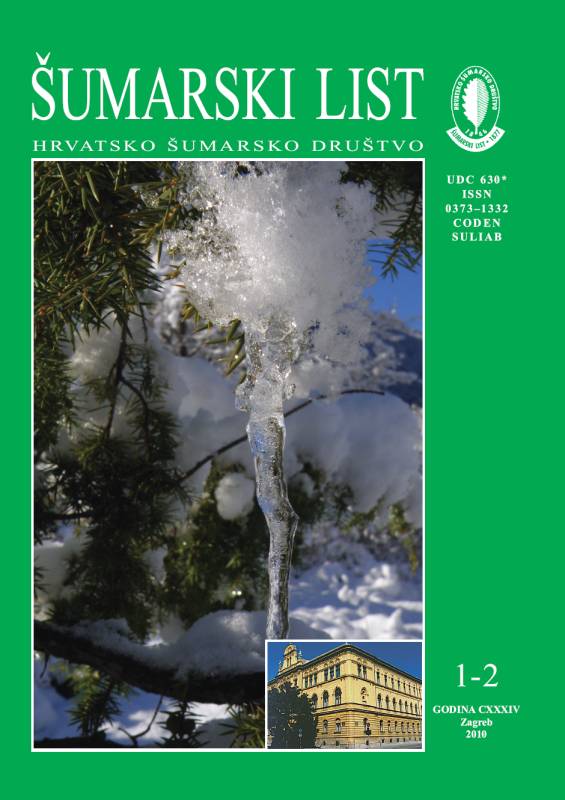
broj: 1-2/2010
pdf (9,0 MB) |
|
||||||||||||||
| RIJEČ GLAVNOGA UREDNIKA | ||
| Branimir Prpić | ||
| ON THE REGENERATION FINAL FELLING IN EVEN-AGED FORESTS pdf HR EN | 2 | |
| IZVORNI ZNANSTVENI ČLANCI | ||
| Idžojtić, M., M. Zebec, I. Poljak | UDK 630* 271 (001) | |
| Revitalisation of the Lisičine Arboretum pdf HR EN | 5 | |
| Trinajstić, Ivo | UDK 630* 164 + 188 (001) | |
| Chorological and Phytosociological Characteristics of Quercus Coccifera L. in Croatia pdf HR EN | 19 | |
| Pandža, Marija | UDK 630* 17 (001) | |
| The Flora of the Papuk Nature Park (Slavonia, Croatia) pdf HR EN | 25 | |
| Štimac, Milan | UDK 630* 222 + 242 (001) | |
| Impact of Forest Tending on Structural Characteristics of Coppices in Lika pdf HR EN | 45 | |
| Avdibegović, M., N. Petrović, D. Nonić, S. Posavec, B. Marić, D. Vuletić | UDK 630* 682 (001) | |
| Readiness of Private Forest Owners in Croatia, Serbia and Bosnia-Herzegovina to Cooperate in Forest Roads Construction and Maintenance pdf HR EN | 55 | |
| Summary: State of private forests and needs of private forest owners have not been in the focus of forest economics and policies research in the region of South-Eastern Europe so far. The past socio-political regime used to prioritize public property and management of private forest was therefore neglected for a long time resulting in degradation of forests. The present lack of forest roads is only one of the numerous consequences and sequentially has lead to lower degree of fulfilment of different activities in private forests (silvicultural treatments, planning, and protection). Nowadays, different processes (transition, restitution, and privatisation) present in region support the development of rural areas where private forests are an important part of rural economy and overall management of natural resources. Findings of this research show that financially more demanding activities like forest roads construction and maintainance present a motive strong enough to establish interests groups like forest owners associations aiming to reach common goals. Research data was collected as a part of PRIFORT project, financed by the Ministry of Agriculture, Forestry, Environment and Water Management of Republic of Austria. The main interest of the project was research of the state of private forests and establishment of private forest associations in countries of the South-Eastern Europe. Theoretical framework was set between the Pluralistic theory and the Theory of Collective Action through which the group behaviour was analyzed. Afterwards, some findings have been confronted with the Exchange theory where better explanations for different behaviour group patterns were found. Homogeneity and heterogeneity of groups were also defined by the Critic Mass theory. The main hypothesis was “readiness for establishing interests groups is more pronounced in connection to activities which are financially more demanding as forest roads construction”. Results for all three countries (Croatia, Serbia and B-H) show that private forest owners are interested in cooperation in construction and maintenance of forest roads. Generally, private forest owners are a part of elderly rural population with relatively small forest plots, mainly used for private needs (fuel wood) and with low income. Private forests are fragmented, with average plots smaller than 1 hectare. Most of the private forest owners expressed the need for having interest associations from which they would expect support in different aspects of forest management (Graph 2). The majority of forest owners expressed interest in cooperation on construction and maintenance of forest roads (Graph 1). Results and conclusions presented in this paper provide useful information for decision makers in government bodies responsible for rural development with special consideration given to possibilities of private forest sector development. | ||
| STRUČNI ČLANCI | ||
| Vrgoč, Petar | UDK 630* 973 + 232.3 | |
| Intelectual Property Rights, Plant Breeding and Nursery Practice pdf HR EN | 65 | |


